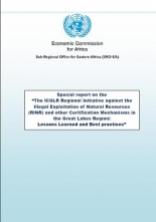Special report on the “The ICGLR Regional Initiative against the Illegal Exploitation of Natural Resources (RINR) and other Certification Mechanisms in the Great Lakes Region

Several African countries are endowed with considerable amounts of mineral resources. These resources play a crucial role in the economy, as they account for a significant share of exports. Indeed, mineral resource exports contribute to merchandise exports in almost half of Africa’s 54 countries.
While the exploitation of mineral resources should have a positive effect on economic growth as it provides sufficient financial resources for building economic infrastructure and human capital, it has not been the case for most African countries. Poor performance in mineral economies has been linked, inter alia, to thedisenfranchisement and conflict about the resources; poor legal and regulatory frameworks and weak institutional capacity, including for negotiation of mineral agreements; illicit financial flows that are lost by Africa through transfer pricing and other mechanisms used by private companies; and the negative impact that resource rents have on the workings of political institutions, as they create political incentives for discretionary or non-transparent management of public expenditure.
The link between natural exploitation and conflict is well documented. Natural resources driven conflicts have been fuelled by grievances on access to rights, perceptions of unfair distributions of benefits, disenfranchised groups or by pure economic reasons: the business of war. Classic cases include the role played by diamonds to sustain conflicts in Angola, Sierra Leone and Liberia, and similarly gold, diamonds, coltan and other minerals in the case of DR Congo. Several mechanisms have been established to curb this link. Chiefly among them, the Kimberley Process, which is meant to improve traceability in the diamond industry and eliminate the flow of conflict diamonds. In the Great Lakes region, which is most frequently cited as an example of the resource curse , the most important framework is the Regional Initiative against the Illegal Exploitation of Natural Resources in the Great Lakes Region (RINR), being coordinated by the International Conference on the Great Lakes Region (ICGLR).
“Conflict minerals” are ores that, when sold or traded, have played key roles in helping to fuel conflict and extensive human rights abuses, since the late 1990s, in the Democratic Republic of the Congo (DRC). The main conflict minerals are the so-called “3TGs”: ores of tantalum and niobium, tin, tungsten; gold; and their derivatives. Diverse international efforts to break the link between mineral trade and conflict in the Great Lakes region have been proposed or are under way. Key initiatives include government and industry-led mineral tracking and certification schemes. These are designed to monitor trade in minerals to keep armed groups from financially benefitting from this commerce, in compliance with firm-level and/or industry due diligence policies that prohibit transactions with armed groups.
Recognizing that the key problem is the missing linkage between the supply chain of natural resource and the formal economy of the ICGLR member States, and the fact that the exploitation and trade within the region are frequently conducted illegally, the ICGLR RINR seeks to redress these issues through a comprehensive approach including an elaborate Regional Certification Mechanism (RCM).